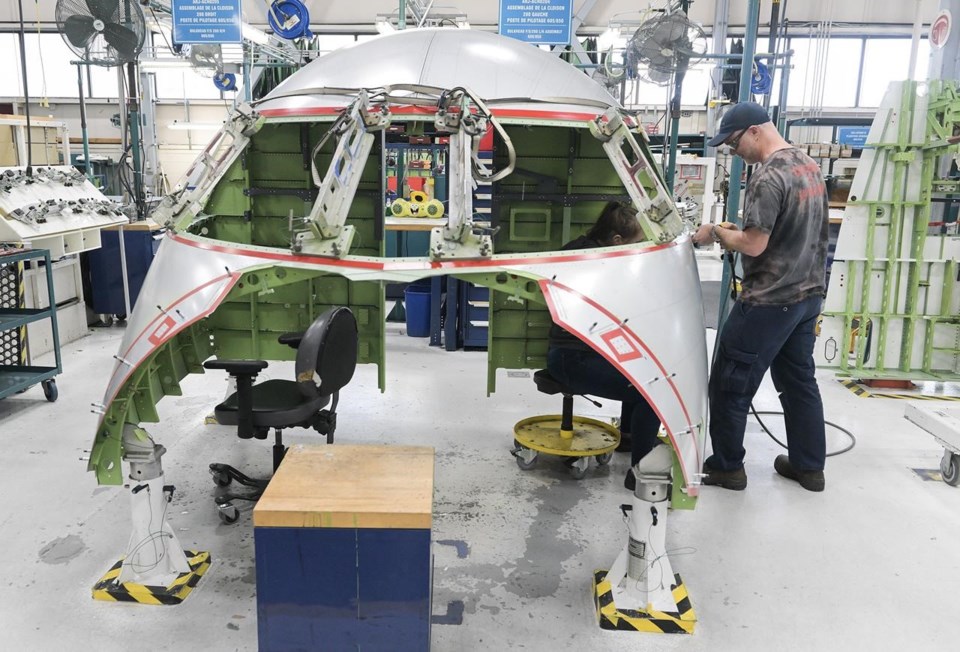MONTREAL — Bombardier Inc. reported a revenue gain of 28 per cent in its latest quarter as the company pledged to meet its business jet delivery target for the year, even amid supply chain pressures and fewer private jet-setters.
The cash surge rode on a wave of plane deliveries and a swelling aftermarket — the services range from maintenance to parts sales and repair — and boosted the plane maker's share price.
Its stock rose $5.09 or more than 11 per cent to close at $50.20 on the Toronto Stock Exchange on Thursday.
Bombardier delivered 31 business jets in the quarter ended Sept. 30, up six aircraft from the same period in 2022 and bringing the year’s total to 82 so far.Â
The tally nonetheless puts a hefty burden on the plane maker as it strives to produce at least 56 more to meet its forecast of 138 planes by the end of the year.
"Everything is in place to deliver greater than 56 aircraft, with some already behind us," CEO Éric Martel told analysts on a conference call Thursday.
Martel and chief financial officer Bart Demosky reiterated that supply strains persist and stressed the need to smooth out kinks in the chain.
“The entire industry has been struggling with an exceptionally difficult supply chain,” Demosky said.
Martel noted Bombardier was not exempt from the snarls, but said his team has managed to "identify problems before they escalate."
Meanwhile, use of private planes has plateaued since the pandemic highs of 2021 — though it remains well above 2019 levels — while mass air travel comes roaring back. Globally, business jet activity — measured by the number of departures — fell four per cent in the first 10 months of the year compared with the same time span in 2022, according to industry data firm Wingx Advance.
Amid that slower pace, Bombardier’s third-quarter backlog dipped by US$100 million to US$14.7 billion from the year before. But its book-to-bill — the ratio of orders received to deliveries billed, a key indicator of near-term demand — reached 1.1.
One analyst questioned Bombardier's ever-larger delivery targets even as business jet use wanes.
"You're increasing supply while orders are declining. You can't do that forever," Noah Poponak of Goldman Sachs told Martel on the call.
"We are preserving the backlog we have," Martel replied.
Though business jet departures in North America were slightly down at 215,277 this October compared to a year ago, they still cruised to 20 per cent above pre-pandemic levels, according to Wingx.
"Business jet market conditions broadly remain healthy," said National Bank analyst Cameron Doerksen in a note to investors.
The aftermarket sales generated by that activity continue to shore up Bombardier's income statement. The segment generated US$414 million in quarterly revenue — well over a fifth of its total — in an 11 per cent increase from the year before.
Martel said Bombardier's Global and Challenger jets are enjoying more flight hours this year, bucking the global trend of descending private plane activity.Â
"The growth in flying hours, of course, brings the airplanes more often to our service centres," he said.
"The reality is also (that) our 5,000 aircraft out there are aging too," he added. "A lot of the Globals, a lot of the Challengers are coming to midlife inspection or coming to 10-year inspection, which requires quite a bit of maintenance."
Since last year, the company has also made use of an expanded network of service centres — 10 on four continents — where repairs can take place.
On Thursday, Bombardier said it incurred a net loss of US$37 million in the three months ended Sept. 30, down from a US$27-million profit in the same period a year earlier. The loss stems largely from capital expenditure of US$99 million — mostly on Bombardier's assembly line for its long-range Global jets at a new manufacturing centre on the edge of Toronto's Pearson airport. Martel said he expects it to be fully operational before April.
Revenues from the Montreal-based plane maker, which reports in U.S. dollars, rose to US$1.86 billion in its third quarter from US$1.46 billion the year before.
Its adjusted net income also shot up to US$80 million or 73 cents per share in the quarter, from a loss of US$2 million or 10 cents per share last year.
The adjusted earnings handily beat analyst expectations of 46 cents per share, according to financial markets data firm Refinitiv.
Bombardier said it remains on track to meet its full-year forecast of at least US$7.6 billion and adjusted earnings before interest, taxes, depreciation and amortization of more than US$1.13 billion.
"The company is displaying solid momentum as it reiterates its full-year guidance," said RBC Capital Markets analyst Walter Spracklin in a note.
"Overall a solid quarter for Bombardier."
This report by The Canadian Press was first published Nov. 2, 2023.
Companies in this story: (TSX:BBD.B)
Christopher Reynolds, The Canadian Press



